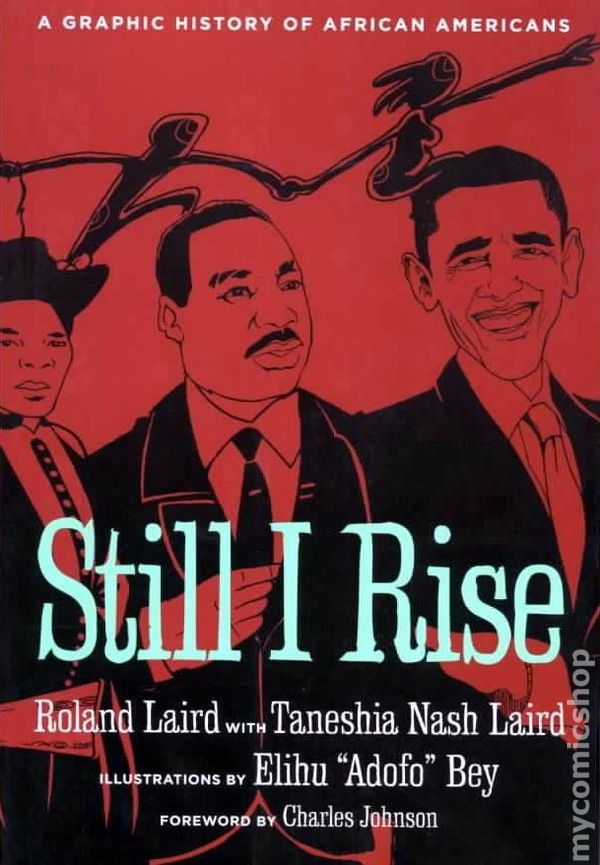Still I Rise by Roland Laird and Taneshia Nash Laird, illustrated by Elihu "Adofo" Bey
Summary: Taking it's title from Maya Angelou's poem of the same name, this comic shows how Africans first came to the Americas and their long struggle to be recognized as Americans will the same rights and minds as everyone else.
The Good: I most certainly walked away from this book with more knowledge than I did going in, which was incredibly thorough for a roughly 200 page book. It also managed to convey something that none of my history classes ever had, this was a constant struggle for rights and freedom, not something that cropped up every now and again but something that was always in the background. In some ways I'm not surprised, my history classes were a bit selective and we tended to study periods, not look at history as a whole, but it's still sad that it's taken me so many years to actually put that into words. And this book didn't just talk about the African-Americans who were politically involved in trying to obtain rights, it also focused on the scientists, the inventors, the artists which was great since it showed that they were (and still are) a complex group of individuals, not just a group of people who can be boiled down to a single issue.
The Bad: I found this book a little much to read in one sitting or even two, it's surprisingly dense, and really wish it had been split into chapters or such since I had a hard time figuring out where a good stopping place was and really needed a few. I also wish that more of the people in the book had been labeled, I was able to guess at which parts were "made-up" conversations to convey a point and which ones were likely real quotes and, even though I could type them into google and see what comes up, I do wish the people had simply been labeled instead. Finally, while I did like the fact that the story had two narrators connecting and explaining all the events (whom I assume were representations of the two authors) at the very end their conversations felt less polished, like I was reading an unscripted argument between two people instead of, well, an argument with two sides that need to be presented. This only happened at the very end, I started wondering if tensions were just boiling over, but other than that I really did like having two, visible, narrators instead of one.
The Art: The art is, well, not in a style I like and I found it to be sloppy at times. Flipping back through it it's hard to articulate what I felt like when I was reading but a lot of the people look rough and caricaturist to the point where I had a hard time telling if someone was new or if we had seen them before and in a couple of places it looks like Bey just didn't have some particular technical skills. I'm ignoring the last 10 or so pages since they were drawn about 10 years later (the book was originally published in 1997 and then republished in 2009), although there is unfortunately a stark stylistic difference between the two and that's also where the aforementioned arguing between the narrators also happens. I do think that it was a good idea to make this story a comic instead of a prose book, it fits the pacing much better, but I do wonder if Bey had some trouble with the deadlines since the art seems to become even cruder and more "off model" the closer it gets to the end and that did bug me as I read it.
The amount of history in this book and the relative readability of it (I wasn't kidding about how dense it was) I'm giving this four stars out of five and really glad that I took it home and read it after all.
